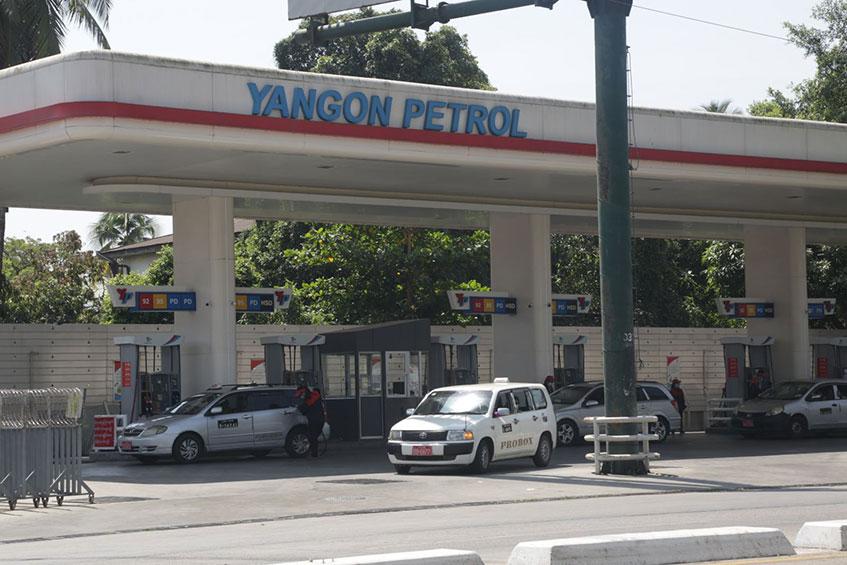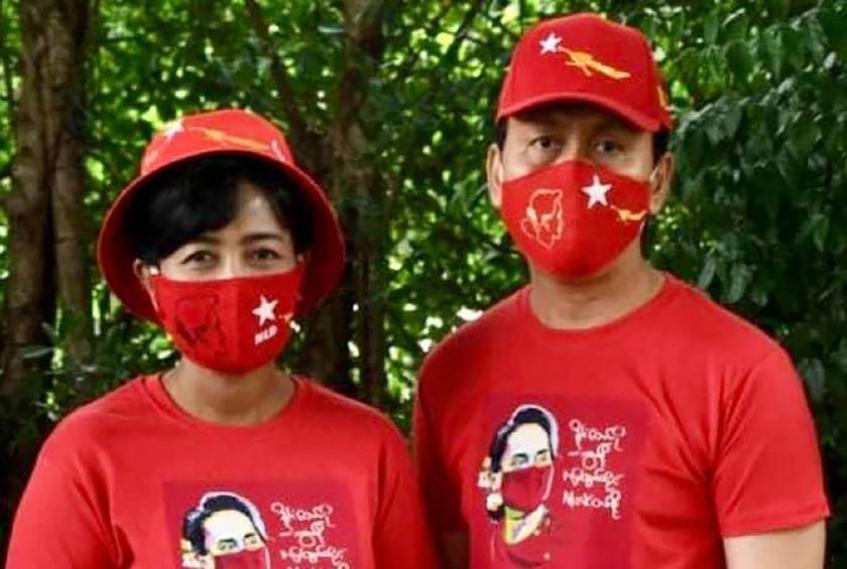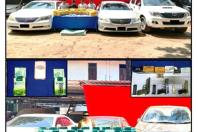While 13 out of 14 state and regional chief minishters have been charged with lawsuits, including corruption charges, former Yangon Chief Minister--the main plaintiff witness testifying against Daw Aung San Suu Kyi--has been the only minister to avoid prosecution from the ruling military government.
While 13 out of 14 state and regional chief minishters have been charged with lawsuits, including corruption charges, former Yangon Chief Minister--the main plaintiff witness testifying against Daw Aung San Suu Kyi--has been the only minister to avoid prosecution from the ruling military government.
After the State Administration Council came into power, not only members of the National League for Democracy’s central government but also members of the region and state governments have been charged under the anti-corruption law.
Many from former President U Win Myint to former State Counsellor Daw Aung San Suu Kyi, former Nay Pyi Taw Council Chairman U Myo Aung, former Kayin State Chief Minister Nan Khin Htway Myint, former Magway Region Chief Minister Dr. Aung Moe Nyo, former Mandalay Region Chief Minister Dr Zaw Myint Maung, former Sagaing Region Chief Minister Dr Myint Naing to former Taninthayi Region Chief Minister U Myint Maung, who replaced Dr. Lei Lei Maw after being charged with corruption for the first time under the NLD government, have been charged under various laws including the anti-corruption law.
U Win Myint and Daw Aung San Suu Kyi have received prison sentences and are also facing more charges.
Moreover, Dr. Aung Moe Nyo has been sentenced to 20 years in prison, Daw Nan Khin Htway Myint to 80 years, Dr. Zaw Myint Maung to four years, former Rakhine State Chief Minister U Nyi Pu to two years, Dr Myint Naing to two years, U Myint Maung to 11 years and former Mon State Chief Minister Dr Aye Zan to two years.
Dr Aung Moe Nyo has received 18 years of prison sentences—three years each for six corruption charges.
Along with Dr Aung Moe Nyo, former Magway Region Minister for Social Affairs Dr. Khin Maung Aye was sentenced to six years in prison for two corruption charges, former Region Minister for Construction U Tin Nwe Oo to 12 years for four corruption charges, former Region Minister for Natural Resources, Electricity and Energy U Myint Zaw to three years for one corruption charge and former Region Parliament Speaker U Tar to six years for two corruption charges.
Likewise, NLD Central Executive Committee (CEC) member and former Kayin State Chief Minister Daw Nan Khin Htway Myint has received a long prison sentence.
She was sentenced to 80 years—two years under Section 505(b) of the penal code, 75 years under the anti-corruption law and three years under section 130(a) of the penal code for breaching the constitutional provisions.
Similar to her, U Than Naing, former Kayin State minister for planning, finance and development affairs, has been sentenced to 92 years in prison—90 years under the anti-corruption law and two years under section 505(b) of the penal code.
NLD Vice Chair (2) and former Mandalay Region Chief Minister Dr Zaw Myint Maung received four years—two years under the natural disaster management law and two years under section 505 (b) of the penal code for issuing an NLD statement in February 2021.
Former Rakhine State Chief Minister U Nyi Pu received two year of prison sentence under section 505 (b). He is also facing charges for election issues and under section 130(a) of the penal code.
They are also facing other charges while they are in prison. Some of their cases could not be settled.
Similarly, ex-union ministers have being charged with corruption. Some have been sentenced while some are still on trial.
Former Union Minister for Religious Affairs Thura U Aung Ko has received prison sentences under section 55 of the anti-corruption law for accepting a gold plate worth 25 million kyats, taking a bribe of cash, and over presentation of religious titles to laypeople.
Former Union Minister for Investment and Foreign Economic Relations U Thaung Tun has been sentenced to nine years in prison after being charged under the anti-corruption law for leasing 9.220 acres of land owned by the Consumer Affairs Department on Upper Pazudaung Road to a company and allowing the company to pay a lower premium for land use.
Ex-Union Minister for Electricity and Energy U Win Khaing and former deputy ministers Dr. Tun Naing and U Khin Maung Win have been prosecuted under section 55 of the anti-corruption law. Legal action was taken against them for causing losses to State funds by letting a foreign company delay the deadline of digging a canal at the Upper Yeywa hydropower project and for approving a budget from the Electric Power Generation Enterprise to pay over 6 billion kyats to CGS Company managed by the Taninthayi Region government without seeking approval of the union government.
Former Deputy Construction Minister U Kyaw Lin received 20 years in prison. He was charged with corruption for appropriating a maintenance budget from the Road and Bridge Department to upgrade the roads and bridges in Minkin Township instead of spending a budget from the Rural Development Department with his intention of getting public support while he, as a candidate, was running for a lower house parliamentary seat in the 2020 election. He was also charged for his failure to pay back the money and the value of rice bags donated to monasteries in Minkin Township under the arrangement of his ministry staff and seeking cash donations from staff of the construction ministry and private companies for election victory.
The Tigyit coal mine case
Currently, a union minister is facing a corruption charge in relation to the Tigyit coal mine. Former Union Minister for Electricity and Energy U Win Khaing and former Deputy Minister Dr. Tun Naing are being prosecuted. Moreover, ex-managing directors and U Chit Khaing, one of Myanmar’s business tycoons, and his son are being charged with corruption.
In extracting coal on a commercial scale from the Tigyit coal mine No.1 Mining Enterprise under the Ministry of Natural Resources and Environmental Conservation and a private company, it was necessary to pay 30% of profit to the State revenue and 70% to the private sector. Regarding 7% mineral tax to be paid to the State, 48,100 kyats shall be paid for a one-ton mineral sale in 2018-2019 fiscal and 56,500 kyats in 2019-2020 fiscal, according to the annually changing prices. However, based on a resolution of the meeting (1/2017) of the ministry’s management committee, only 12,000 kyats was paid for a one-ton sale of coal. For the sale of over 2.3 million tons of coal from 2018 to 2021, the State suffered a total loss of over 15,900 million kyats—over 1,900 million kyats in tax and over 14,000 million kyats in the 30% profit share. Consequently, Former Union Minister for Natural Resources and Environmental Conservation U Ohn Win has been charged under section 55 of the anti-corruption law. Former Managing Director U Kyaw Hsan of No.1 Mining Enterprise responsible for work supervision as agreed in the contract, and U Chit Khaing, chairman of the partner company, have been charged under section 55/63 of the anti-corruption law.
Additionally, “they failed to follow the agreement provisions to produce 2,000 tons of coal per day as instructed by a directive (1/2017) of the President Office based on project capacity and reduced to 1,750 tons per day. They added the price of one ton. Production cost per ton exceeded 5,809.12 kyats. From 2019 to 2021, over 8,200 million kyats for 1.4 million tons and over 1,200 kyats in tax totalling over 9,400 million kyats were lost for the State, according to the investigation. Therefore, U Win Khaing and Dr Tun Naing was charged under section 55 of the anti-corruption law, Managing Director U Than Naing Oo of Electricity Supply Enterprise and Managing Director U Win Min Khaing of the partner company under section 55/63 of the anti-corruption law,” the Anti-Corruption Commission announced.
Who is being sued for the YP gas station’s repercussion?
Under the previous NLD government, the public heavily criticized the government as Yangon Petrol (YP), a petrol company, was allowed to lease land at a reduced price.
The allocation of this land was much less than the original value. Many good state-owned plots of land for sale at petrol stations were sold at extremely low prices, including land that could hold up to 10 petrol stations simultaneously.
Yangon Petrol applied to the relevant government for the purchase of 2,000 kyats ($US1) per square foot for 26 state-owned land plots for the exact area, and all 26 plots of land were approved to be purchased for 2,000 kyats per square foot.
Former Yangon Region Chief Minister U Phyo Min Thein said that the regional government had not invested in YP petrol stations.
Former Chief Minister U Phyo Min Thein said at the two-year anniversary of YRTA, “No investment can be made. It is because the regional government will not be able to make the investment without the approval from the parliament. However, we can co-sponsor companies that will work with the government to reduce the price of fuel. We can make arrangements for easy and smooth trading.”
In the Daily Eleven newspaper issued on January 31, 2019, U Phyo Min Thein said there is no government investment in Yangon Petrol stations. Although the previous government used to sell petrol at a reduced price of up to 10 times the price of petrol, it would not immediately follow suit if prices rose.
However, the claim that Yangon Petrol does not offer special privileges for new stores is questionable. The first is that it takes around one year to scrutinize for the opening of a gas station if it is a subject to scrutiny. No such process has been seen in YP case. According to MP Daw Sandar Min of the No. 1 Constituency for Seikkyi Khanaungto Township and Chairman of the Finance, Planning and Economic Committee, YP petrol stations will be able to apply land plots and build new gas stations within six months.
The second is the sale of large tracts of state-owned land for 2,000 kyats per square foot. This is a privilege.
At Yangon Petrol Company, U Tin Naing Soe, a former officer from Yangon Region petrol sales, was the Managing Director. U Win Swe, U Aung Maw Thein, U Aung Shwe, U Aung Myo Zaw and U Zin Min Aung are directors. U Tin Naing Soe is known to be a former army officer and he is said to be a 30th Batch of DSA graduate.
What is interesting about this case is that except for U Tin Naing Soe, U Win Swe, U Aung Maw Thein, U Aung Shwe, U Aung Myo Zaw and U Zin Min Aung are members of the Board of Directors of PT Power. It's astonishing to see the owners of PT Power and BOC have been able to purchase state-owned land for 2,000 kyat ($US1) per square foot, and how they can be able to repay the benefits for the state. It is questionable whether the benefits received by the state will the same as the previous privatization of 246 state-owned gas stations.
According to an investigation by the Daily Eleven, the state-owned land sold for 2,000 kyat per square foot has already been set under the name of Yangon Petro Company. The Daily Eleven sent a question to Yangon Petro about the owner’s name of the land plots, but the company did not make a response.
However, the Anti-Corruption Commission (ACC) said in a statement that the Yangon Petro was working to open a petrol station in the name of a joint venture with the Yangon Region government. Former Minister for Agriculture, Livestock, Forestry and Energy U Han Tun, former Yangon Mayor U Maung Maung Soe, former Deputy Mayor U Soe Lwin, former Secretary Daw Hlaing Maw Oo, and former Joint Secretary U Than have been charged under the Anti-Corruption Law.
The commission's statement did not mention the land plots of YP petrol, but according to an investigation by Weekly Eleven, the case involved the land plots of YP petrol.
Former Yangon Region Minister for Agriculture, Livestock, Forestry and Energy U Han Tun, former mayor U Maung Maung Soe, former deputy mayor U Soe Lwin, former secretary Daw Hlaing Maw Oo and former joint secretary U Than granted two land plots in Dagon Myothit Township to build fuel stations for a joint-venture with the regional government at a rate of 2,000 kyats per square foot instead of 20,000 kyats per square foot fixed by Internal Revenue Department to issue 60 year land lease grant in 2018 and 2019, which lost over 4.2 billion kyats for the state. Former Yangon Region Cabinet Minister U Han Tun, former mayor U Maung Maung Soe and former joint secretary U Than issued a 60-year land lease grant for more than 63 acres of land in Dagon Myothit Township in 2019 to open a petrol station under the name of a joint venture company with the Yangon Region government at a rate of 2,000 kyats per square foot instead of 100 million kyats per acre fixed by the Internal Revenue Department losing over 800 million kyats. In addition, the land owned by the joint venture was allowed to be transferred to the name of the board of directors of the company and he sold 63 acres of land to another private company for 6,570 million kyats, said the ACC in a statement.
The statement said BOD member U Zin Min Aung, prosecuted under the Anti-Corruption Law, was working to open YP gas stations.
According to reports released in 2019, U Tin Naing Soe, a former officer from Yangon Region petrol sales, was appointed MD at Yangon Petro Company. U Win Swe, U Aung Maw Thein, U Aung Shwe, U Aung Myo Zaw and U Zin Min Aung are directors.
According to the list, U Win Swe, U Aung Maw Thein, U Aung Shwe, U Aung Myo Zaw and U Zin Min Aung except for U Tin Naing Soe are also members of the Board of Director of PT Power. However, according to the ACC, only U Zin Min Aung was included in the corruption case against YP and no other officials were involved. Both top businessman U Chit Khaing and his son, managing director U Win Min Khine, has been prosecuted under the Anti-Corruption Law in regards to a coal-fired power plant in Tikyit, and only one director has been prosecuted under the Anti-Corruption Law in the YP case. Weekly Eleven is continuing to follow-up information of the YP case carried out by the ACC.
The witness that changed sides
During the era of the NLD government, the development works of the economic capital Yangon were done more extensively than the cities of other regions and divisions. However, there were numerous questions and disputes among the people in regards to these development works.
The purchase of the YBS buses, the purchase of 200 school buses, the unsuccessful Yangon Night Market, and other cases have been widely questioned among the Yangon public.
“It is believed that action remains to be taken in regards to the report by the Auditor’s General of the Yangon Government,” says former Yangon Region MP U Kyaw Zayya.
“Close attention should be given to the purchase of the 30 billion kyat emergency emergency generator, the construction of the Yangon Night Market, the incomplete construction of the Central Traffic Control Center in Pyidu Yinpyin (public square) in which the contract was violated, the YBS buses case, the purchase of 200 school buses, and the use of 64 billion kyats on the ‘kyu kyaw,’” U Kyaw Zayya adds.
U Phyo Min Thein, who is chiefly responsible for the YP Petrol incident, is not among the individuals that the Anti-Corruption Commission has taken action on.
Among those charged is Daw Nilar Kyaw, who was sentenced to 16 years of labor and prison for 16 counts of corruption. U Naing Ngan Lin was also sentenced to five years in prison for five counts of corruption.
It is worth noting that Daw Nilar Kyaw testified alongside U Phyo Min Thein against Daw Aung San Suu Kyi (as plaintiff witness) in regards to the land case of the Daw Khin Kyi Foundation.
Many in the public have questioned why one of the two witnesses has been jailed for corruption, but U Phyo Min Thein (the main figure in the Yangon Region government) has not been prosecuted.
Spokesperson of the State Administrative Council (SAC)Maj. General Zaw Min Tun told a news conference in Naypyitaw on June 12 that no action has been taken against Phyo Min Thein although he has been the subject of public outcries over corruption.
However, Maj. General Zaw Min Tun said that no one is above the law and processes will be conducted according to the law.
“According to the Anti-Corruption law, action must be taken on both the bribe-taker and bribe-giver. I want to say that the first priority of the State Administrative Council is to form the UEC and check the voter lists. White making these investigations, we also find other issues so we have to conduct these processes. The lawsuit was filed because we obtained full evidence in this process. In relation to the previous question, for us, we have no one above the law. We must saw that it must be done according to the law,” says Major General Zaw Min Tun.
Former Yangon Region Chief Minister, a key figure of the NLD government, testified as plaintiff witness along with his wife (Daw Khin Mi Mi Khwe) that he provided bribes in the form of gold bars to Daw Aung San Suu Kyi in order to receive “her protection.”
U Maung Weik, the owner of Sae Paing Company, also testified as prosecution witness against former ministers, including Daw Aung San Suu Kyi, in regards to their corruption.
Daw Aung San Suu Kyi has since been sentenced in prison as a result of U Phyo Min Thein’s testimony that he bribed her with gold and dollars. Therefore, it is obvious that after the political changes, U Phyo Min Thein has acted as the witness that has entirely changed his political side.
Who is above the law?
As mentioned above, while all the state and regional chief ministers have been charged with other crimes, including corruption, it is astonishing that only former Yangon Chief Minister U Phyo Min Thein has been exempt from facing similar charges.
However, during his time as Yangon chief minister, U Phyo Min Thein was the most criticized former chief minister in regards to the loss of billions of kyats of public finances, especially in regards to the Yangon Petrol case.
No one can deny that U Phyo Min Thein holds the most responsibility for corruption in regards to the YBS and school bus issues, the purchase of 30 billion kyats emergency generator, the construction of Yangon Night Market, and contract agreement of the traffic control center of Pyidu Yinpyin public square.
The lack of investigation into U Phyo Min Thein’s corruption cases raises questions of the current Anti-Corruption Commission because U Phyo Min Thein is acting as the plaintiff witness in corruption cases against former government officials.
Additionally, although U Phyo Min Thein has testified in connection to Daw Aung San Suu Kyi’s corruption case, he has not testified in regards to any corruption cases involving Yangon Region.
Regardless, no one can deny that U Phyo Min Thein was the most problematic and infamous figure from the previous government in regards to corruption.
Many are watching with interest in regards to the actions taken against U Phyo Min Thein by responsible organizations such as the Anti-Corruption Commission. Therefore the Anti-Corruption should ensure that corruption cases from the previous government are not held to a double standard and that no one is above the law.














